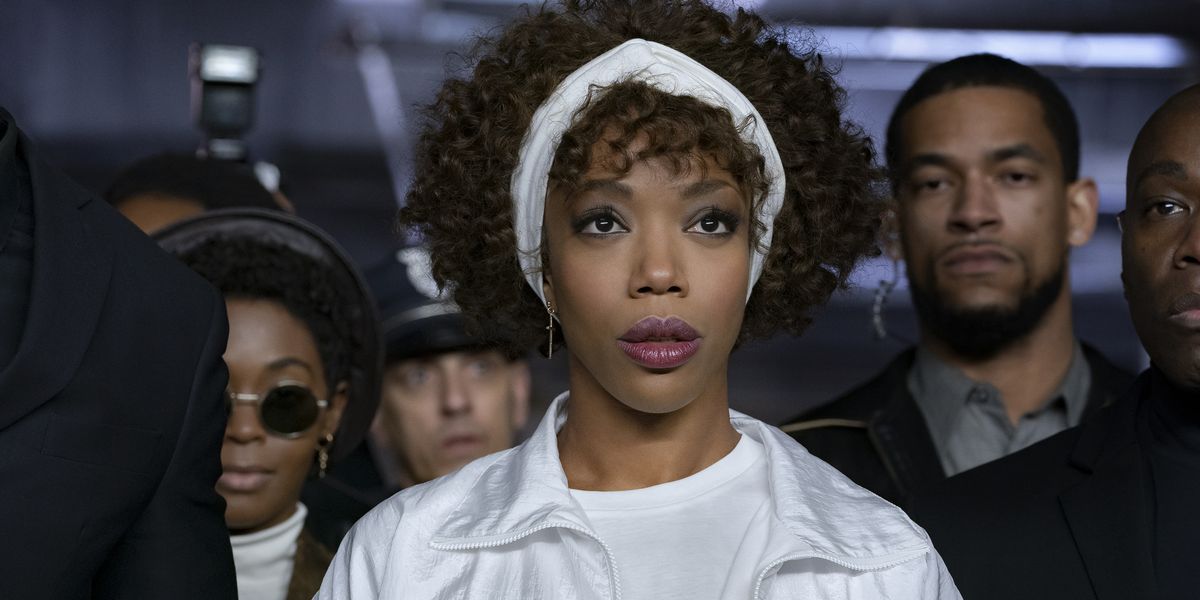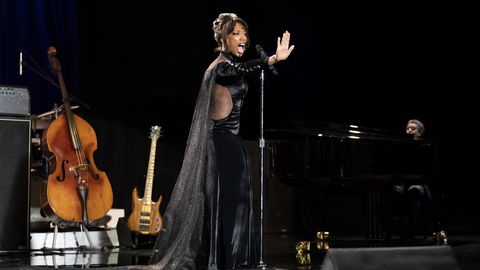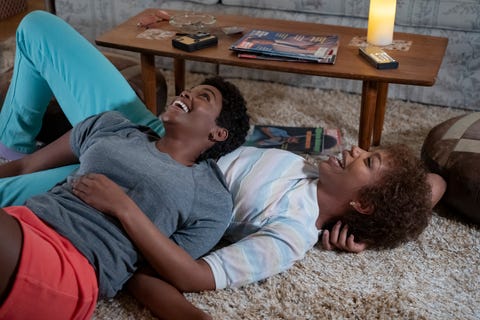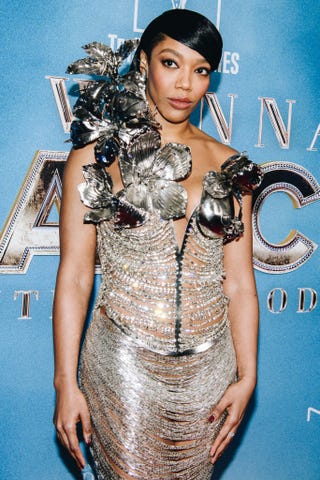Naomi Ackie is on the move. Both in her career—which has taken a major leap forward as she fronts the new Whitney Houston biopic hitting theaters today—and literally, as I catch her walking the streets of London in search of a new flat during our Zoom call. The 31-year-old British actress has mostly been known for smaller roles on television and film, like former stormtrooper-turned-freedom fighter Jannah in 2019’s Star Wars: The Rise of Skywalker and Bonnie in Netflix’s End Of The F***ing World for which she won a Best Supporting Actress statue at the 2020 BAFTA awards. Whitney Houston: I Wanna Dance With Somebody marks an exciting new chapter of her life and, while she’s done working for 2022, her future is filled with buzzy projects—including roles in Zoe Kravitz’s feature directorial debut Pussy Island and Oscar-winner Bong Joon-ho’s highly anticipated sci-fi project Mickey 17—that promise to launch her further into the stratosphere.
Here, she talks to ELLE.com about portraying Whitney, speaking to the superstar’s family, and feeling a new sense of empowerment in her life and career.
I heard you say you first encountered Whitney as Fairy Godmother in Brandy’s Cinderella. Can you talk to me about the first moment you saw her, and what captivated you about her?
It was really about, for one, the costume. I realized recently that costumes were a big part of me starting to love performance because of the way they move and what they say about a person. And with Whitney, because I’d never seen her in person, she came across so smooth and cool and she was making wishes for someone who looked like me. That felt amazing. She had such a sense of humor in that role too. It was the first time I had seen something like that.
So for this role, was it an immediate yes when you got the part or did you do a pros and cons list about signing onto a biopic about such an icon?
It was definitely a pro/con before I started auditioning. While I was auditioning, it was something I was thinking about. But pretty early on, once I had gotten past some of my pros and cons, which were really about the amount of exposure, not looking like Whitney at all, [and] the amount of work I would need to do to be able to get close to playing her, then I knew that if they said yes to me, that I would say yes, even though those were some of the cons.
And regarding some of the challenges of this part, it’s a different kind of acting when you’re playing a real person and not a made up character. Are there mannerisms that you noticed and made sure to nail down, like a specific way that Whitney walked or talked?
Yeah, I was trying to capture as much of it as I possibly could, but in the end it was almost a surrender to the amount of research that I was doing. I find that with a lot of the work that you do when it’s physical, if you immerse yourself in the world, it becomes easier for that to be a part of your fabric when you are working. The challenges were really about specifying the parts of her that I noticed that I thought were particularly poignant or special or funny or very human that I wanted to convey to give her as much humanity as I possibly could.
I really enjoyed the scenes in the movie when she’s being interviewed. Those are such iconic interviews because she wasn’t a demure person. I think you captured that aspect of her very well.
Thank you. Those are the parts that we know of Whitney so it felt right to do those ones as verbatim and as specific as possible. And in my mind I was like, “If I can capture those ones really technically well, then the rest of it I can kind of expand on some of the bigger themes and leave a little bit up to my imagination.”
Throughout her life, there was a lot of effort put into minimizing her relationship with Robyn Crawford, but this movie has her as a focal point of Whitney’s story. What was the decision behind that? Did you talk to Kasi [Lemmons, the director] about that?
When I read the script that was already in there and to me, it felt so right that I didn’t even really have to have a conversation because it was so beautifully written and listening and reading about their relationship I was like, “This is stunning. This is a really big part of her story.” It felt like exposing some of Whitney’s early years really does again help to give her humanity and pull her away from the icon status in a way that helps us to feel closer to her and bring up some of more of the universal themes that I think we can look at in Whitney and others who are that famous. It was something I had known about and to know that I had a chance to expand on that idea and show it was really attractive to me.
The movie uses her voice for the singing parts but you actually have a beautiful singing voice yourself. What role does music play in your life? Are you someone who enjoys karaoke? Did you do musical theater? What’s your connection to music?
I’m definitely a “singing in the house on my own” kind of girl. When I was younger, I had a real huge affinity with musicals and I still do. I tried auditioning at drama school, I auditioned to play Nala in The Lion King on the West End a number of times. But, I just wasn’t good enough. It’s just a totally different skillset. So, I really know my place with singing. I can hold a tune, but I’m not up here. But I love to do it whenever I get a chance.
There’s no way, obviously, for the movie to have included every performance that Whitney’s ever done, but is there one that you really wanted to make sure was in the movie or that you were happy was included? The one you were most excited to reenact?
Oh my gosh, definitely the AMA Medley because I had never actually seen that one. I did not know that existed. That one blew my mind. But also the “I Will Always Love You” one too, because again, for me, the most special part of watching Whitney live was seeing her tell a story in a song. It’s a different vibration and it reaches audiences in a very specific way. Watching her be a storyteller on stage with her voice is always magical, but those were the ones where I really felt it.
And great costumes for both of them.
And great costumes for both of them.
The movie doesn’t portray her death, which fans will be happy to know because that would’ve been very Lifetime. What kinds of discussions did you have with Kasi about how you’d be handling the more sensitive subject matter in this film? Because that was obviously part of her life.
That was really important to me to do right and it was a constant negotiation because I didn’t want there to be any kind of extra speculation written into the narrative of how Whitney died that could sometimes be seen as fact when it comes to a biopic. Whitney went through so much when it comes to press and being seen, and there’s almost, for me with biopics anyway, there’s a dramatic irony to them. We kind of know most of the story or we think we do. The idea of showing that sort of stuff didn’t sit right with me as a performer. I know that if [my] story was being told, I wouldn’t want that to be shown about me. So, it was really about, through talking with her family, but also just from an empathy perspective, just being like, actually, “This film is about celebrating who she was as a person and what she was able to achieve in her life, not necessarily showing her at her worst.”
Which members of the family did you have contact with during this?
Pat Houston, Gary Houston, Clive Davis, and Rickey Minor were the main people I was talking to. But then it was also people who had worked with Whitney at different parts of her life, who had met her on an occasion. It was actually quite nice to kind of become a conduit because you are portraying Whitney. People are drawn to you and they just naturally tell you their stories. I guess they project Whitney onto you, especially if you’re dressed like her.
Something that she says in the movie is, “All Black women are exhausted.” The screening that I went to gave a collective, “Mm-hmm,” to that. Right now though, are you feeling exhausted? What keyword describes your mood as 2022 turns into 2023?
I’m happy. I’m tired, but I’m not exhausted. I was exhausted. I have been exhausted. But there is something quite transformative for me about these last two years. I feel replenished within myself. I think that’s about how I’ve changed the structure of how I work. I’m not taking it personally anymore. I’m really trying to detach my work from my actual life. I’ve left this job and the job since feeling quite full and feeling ready to name that, yes right now, creatively, I don’t have much to give, which means I have to go and live some life, chill out, go on some adventures, and then come back fully replenished to make more work.
This is your first big leading film role, and you’re in your thirties now—does it feel like you’re in a new chapter of your life? And are you reorienting your career decisions now in a different mindset?
Yeah, for sure. Look, I’ve just come back home and I was only done yesterday and I’m like, “Right, get a new place, find a new space for myself.” I feel more grounded than I’ve felt for a really long time. I feel energized to make more work. I feel extremely empowered and a real sense of stillness in my life that I’m very grateful for. Also, I’m grappling with the idea that life changes, life is a changing thing. Right now I’m so happy that part of me is scared that the happiness will go or something bad will happen next. But also there’s a part of me that’s like, “That’s natural.” And actually [remember] just to stay in the moment and be happy with the work that I’ve done over the past two years, ready to move on, and ready to do something new. I’m ready to see what unfolds for me.
And you’ve got some cool stuff lined up. I heard Bong Joon-ho’s Mickey 17 is in production now, that’s major.
Yeah, so we finished that. I finished Pussy Island. It’s been a brilliant two years. I can’t lie. I’ve learned so much and it hasn’t all been easy. I think I had some quick ego deaths that I had to grapple with that really got me on the floor at some points. But ultimately, I look back, even today, I sat in my flat and I was like, “Wow. I’m so grateful for all the times that it was actually really hard.” Because I’ve come back out of it going, “I see it and I’m grateful for it because I’ve learned.” I’ve learned so much, man.
I’m curious, since you’re looking for a flat right now, what kind of home are you trying to create?
Something warm and cozy. All I want right now, my main goal, is a bathtub and a bedroom that only has a bed in it and nothing else.
This interview has been edited and condensed.
Naomi Elias is a freelance writer whose work has appeared in The Cut, Allure, and Interview Magazine.



